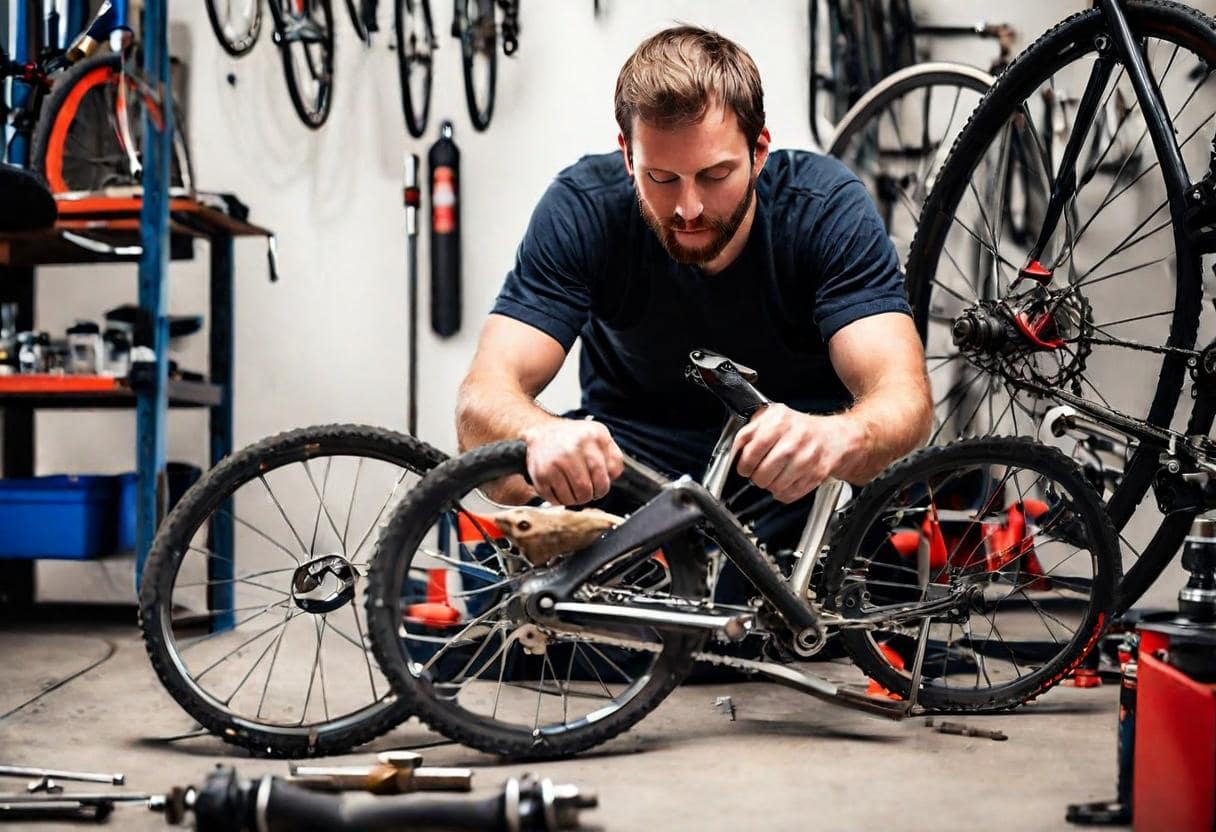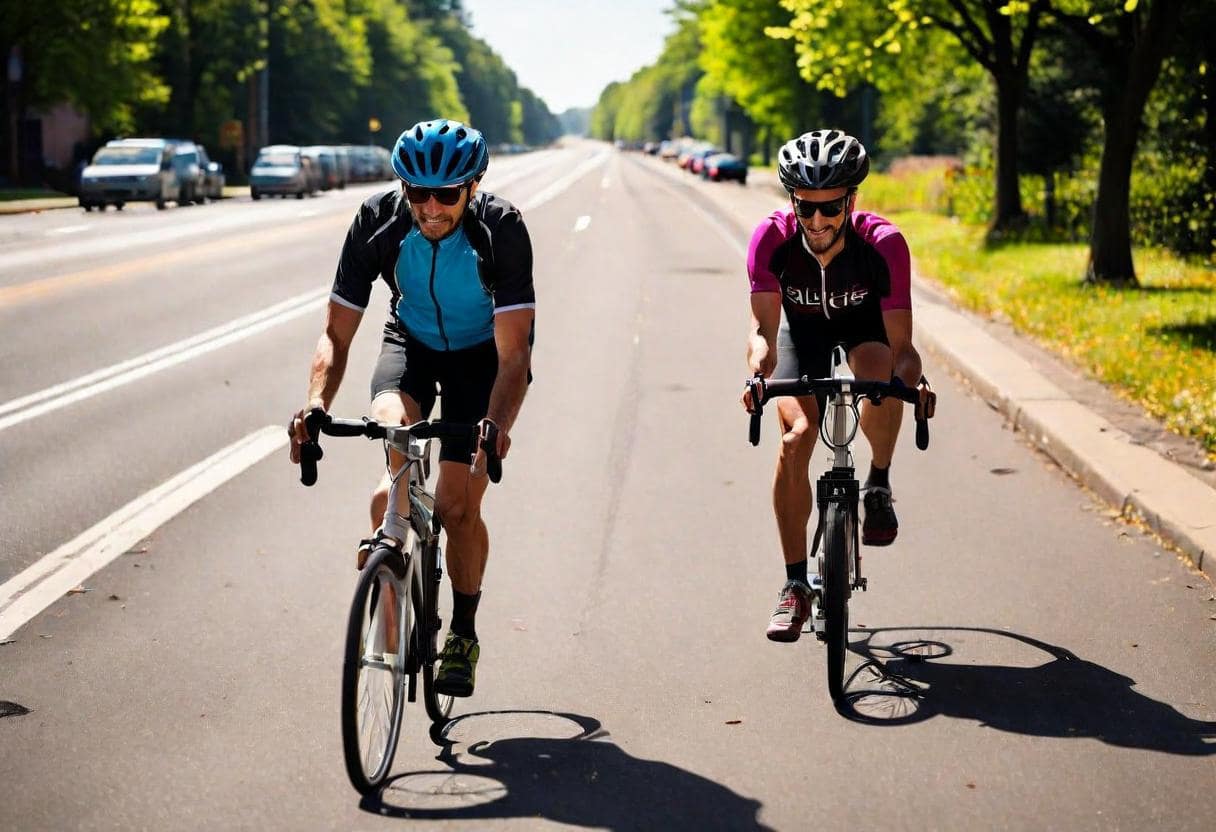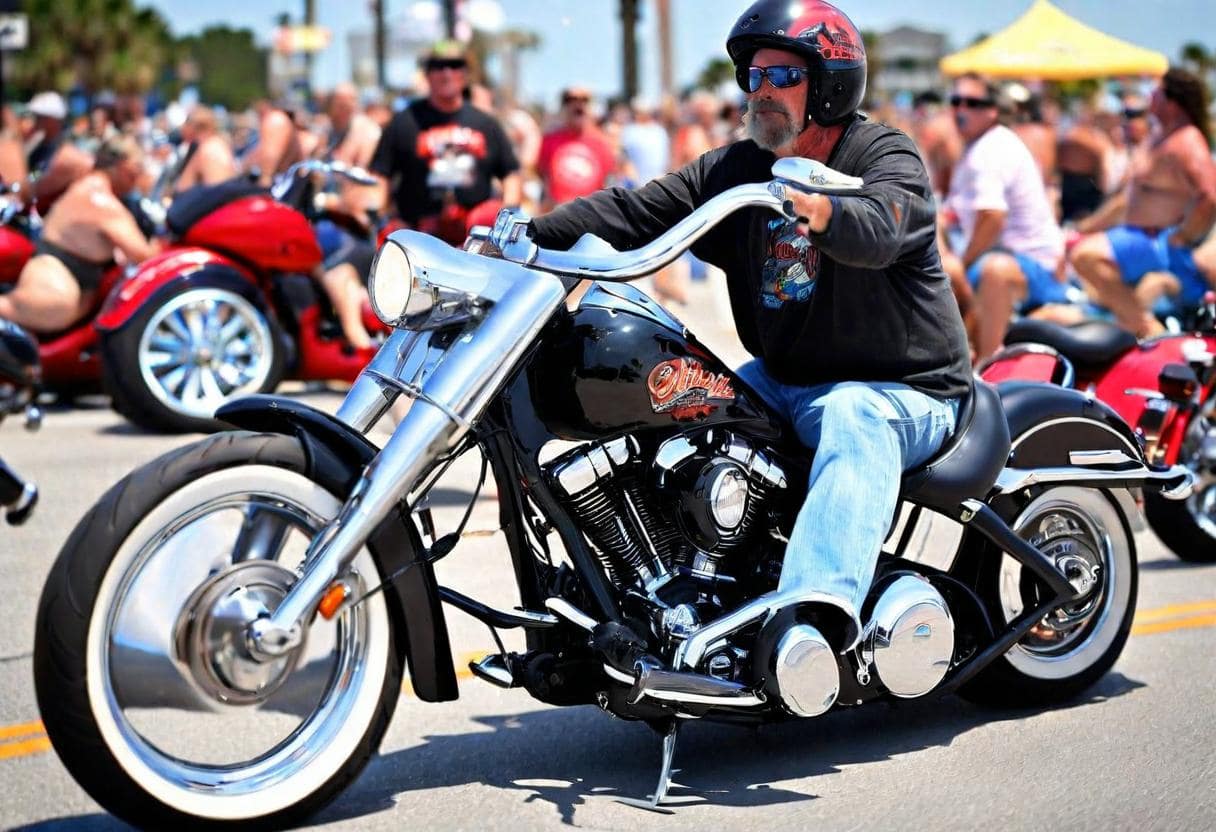1. Introduction
If you love bicycles and enjoy tinkering with mechanical parts, becoming a bike mechanic might be your perfect career path. Bike mechanics are crucial in keeping cyclists on the road, ensuring bikes are safe and well-maintained. This guide aims to provide a comprehensive, step-by-step pathway to how to become a bike mechanic in the United States. From understanding the daily responsibilities to gaining the essential skills needed, we’ll cover everything you need to know.
What Does a Bike Mechanic Do?
Bike mechanics are the unsung heroes of the cycling world. They work in bike shops, repair centers, and even for professional cycling teams, ensuring that bikes are in top condition. Here are some general responsibilities and daily tasks you can expect:
- Diagnosing Bike Issues: Identifying problems with bikes, from simple flat tires to more complex gear and brake issues.
- Performing Repairs: Fixing identified issues, which can include replacing parts, adjusting gears, and tuning brakes.
- Maintenance Services: Conducting regular maintenance checks to prevent future problems.
- Customer Interaction: Communicating with customers to understand their bike issues and explaining the necessary repairs.
- Inventory Management: Keeping track of parts and tools needed for repairs and maintenance.
- Staying Updated: Keeping up-to-date with the latest bike technologies and repair techniques.
Skills Required: Technical Skills and People Skills
Being a bike mechanic requires a blend of technical and interpersonal skills. Let’s break these down:
Technical Skills
- Bike Anatomy Knowledge: Understanding the different parts of a bike and how they work together.
- Repair Techniques: Knowing how to perform various repairs, from fixing a flat tire to adjusting derailleurs.
- Tool Usage: Proficiency in using bike-specific tools like wrenches, screwdrivers, and spoke keys.
People Skills
- Customer Service: Being able to listen to customers, understand their problems, and explain repairs clearly.
- Communication: Explaining technical issues in a way that customers can understand.
- Problem-Solving: Quickly diagnosing issues and finding efficient solutions.
Essential Skills Needed to Become a Bike Mechanic
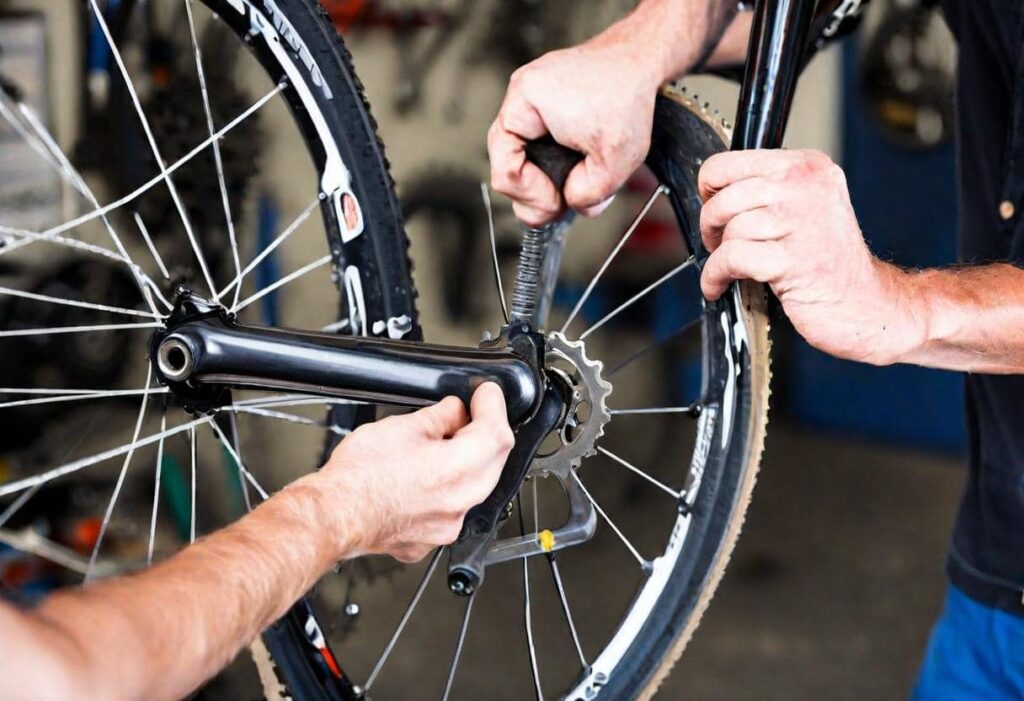
To excel as a bike mechanic, you need a robust set of skills. These can be categorized into technical and people skills. Both are equally important to provide high-quality service and ensure customer satisfaction.
Technical Skills
- Bike Anatomy: Knowing every component of a bike and how it functions is fundamental. This includes parts like the frame, handlebars, tires, brakes, gears, and chains.
- Repair Techniques: From basic fixes like patching a tube to complex repairs such as rebuilding a wheel, mastering repair techniques is crucial.
- Tool Usage: Being adept at using various tools, such as torque wrenches, spoke keys, and chain tools, is essential for efficient and precise repairs.
People Skills
- Customer Service: A significant part of a bike mechanic’s job involves interacting with customers. Good customer service skills help in understanding their needs and building a loyal customer base.
- Communication: Clearly explaining the issues and the necessary repairs helps in managing customer expectations and ensuring they are satisfied with the service.
- Patience: Working on bikes can be challenging, and dealing with customers requires patience, especially when explaining technical details to those who might not be mechanically inclined.
Building Experience
Experience is invaluable in the bike mechanic profession. Here’s how you can gain it:
- Apprenticeships and Internships: These provide hands-on experience under the guidance of experienced mechanics.
- Volunteering: Many community bike shops and non-profits offer volunteer opportunities, which are great for gaining experience and learning in a real-world setting.
- Part-Time Jobs: Working part-time in a bike shop while studying or during the weekends can help you gain practical experience.
Education and Certification for Bike Mechanics
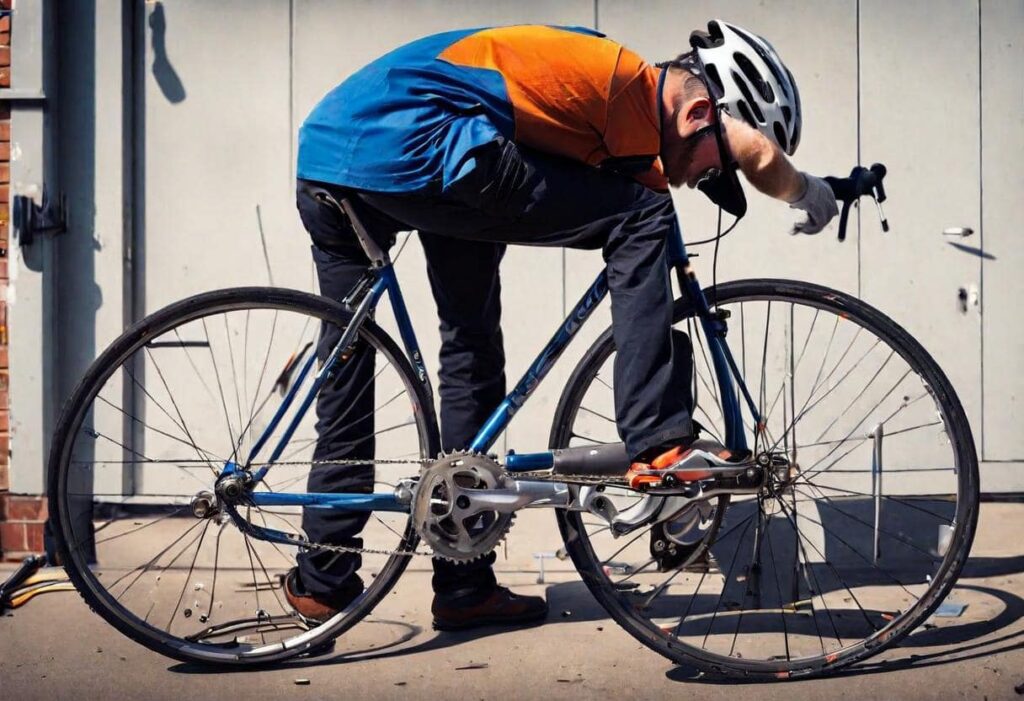
Becoming a proficient bike mechanic starts with a solid educational foundation. While formal education isn’t always mandatory, it certainly provides a significant advantage.
Starting with a High School Diploma or GED
The journey typically begins with a high school diploma or a GED. Basic education ensures you have essential skills like reading, writing, and math, which are crucial for understanding manuals, communicating with customers, and handling measurements.
Specialized Courses and Certifications
Beyond basic education, specialized training can significantly enhance your skills and employability. Here are some key institutions and certifications to consider:
United Bicycle Institute
The United Bicycle Institute (UBI) is renowned for its comprehensive bike mechanic courses. They offer certifications in various aspects of bike repair and maintenance. Courses cover topics like:
- Bicycle assembly and tuning
- Advanced repair techniques
- Suspension systems
- Frame building
These courses provide hands-on training, ensuring you gain practical experience.
Park Tool School
Another excellent option is the Park Tool School. This program is offered through various bike shops and educational institutions across the U.S. Key features include:
- Curriculum designed by industry experts
- Courses ranging from beginner to advanced levels
- Emphasis on real-world problem solving and repairs
Park Tool School is a great way to gain practical skills that are directly applicable in a bike shop setting.
Online Courses
For those who prefer flexible learning schedules, online courses are a viable option. Websites like Coursera and Udemy offer bike mechanic courses that cover:
- Basic bike maintenance
- Advanced repair techniques
- Specialized skills like wheel truing and brake adjustments
Online courses often provide video tutorials, quizzes, and certification upon completion, making them a convenient choice for busy individuals.
Getting Hands-On Experience
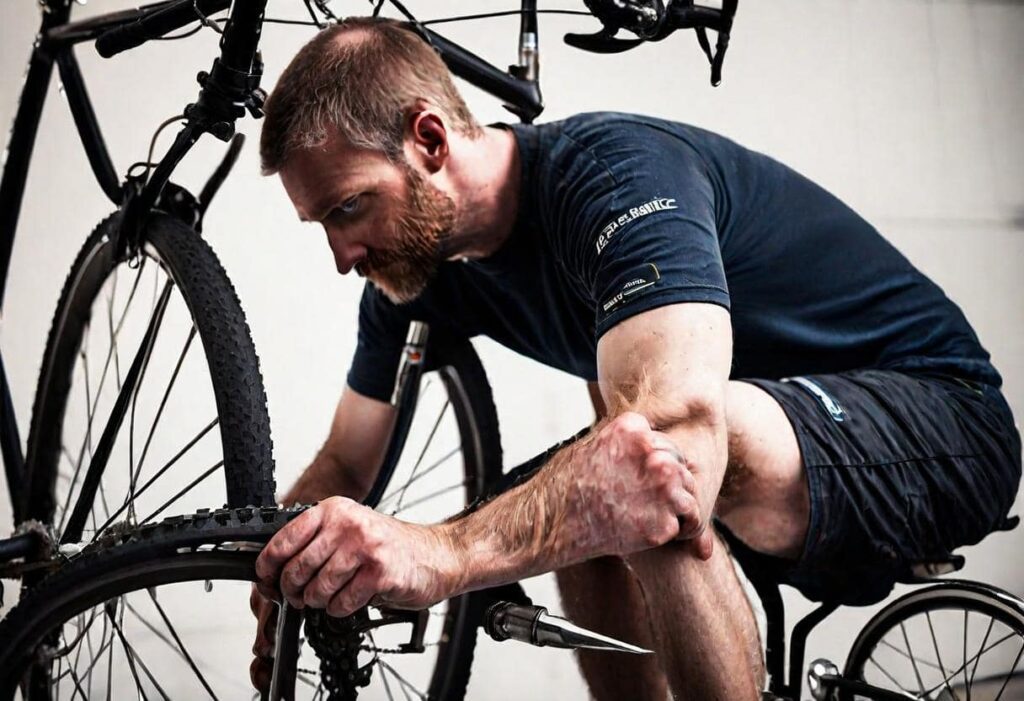
Education and certifications are important, but hands-on experience is where you’ll truly hone your skills. Here’s how to get that valuable experience:
Importance of Apprenticeships and Internships
Apprenticeships and internships are critical in this field. They provide real-world experience and mentorship from seasoned professionals. Here’s why they matter:
- Learning from Experts: Apprenticeships allow you to work under experienced mechanics, learning trade tricks that aren’t covered in textbooks.
- Practical Application: You can apply theoretical knowledge in real-world scenarios, dealing with actual customer bikes and problems.
- Building a Network: Working in a shop helps you build relationships within the cycling community, which can be beneficial for future job opportunities.
How to Find and Apply for Apprenticeships
Finding an apprenticeship requires some effort, but it’s worth it.
- Research Local Bike Shops: Identify bike shops in your area and check if they offer apprenticeship programs.
- Prepare Your Resume: Please highlight any relevant experience, certifications, and your passion for bikes.
- Reach Out: Visit shops in person, call them, or send an email expressing your interest in an apprenticeship. Be persistent and professional.
- Networking: Attend cycling events and connect with industry professionals. Personal recommendations can open doors to apprenticeship opportunities.
Volunteering Opportunities at Local Bike Co-ops and Community Events
Volunteering is another excellent way to gain experience and give back to the community. Many cities have bike co-ops and community events where you can volunteer. Benefits include:
- Hands-On Practice: Gain practical experience by repairing bikes for the community.
- Community Engagement: Build relationships with local cyclists and bike enthusiasts.
- Skill Development: Learn from other volunteers and experienced mechanics.
Websites like Bike Co-op Directory can help you find local co-ops where you can volunteer.
Building Your Career as a Bike Mechanic
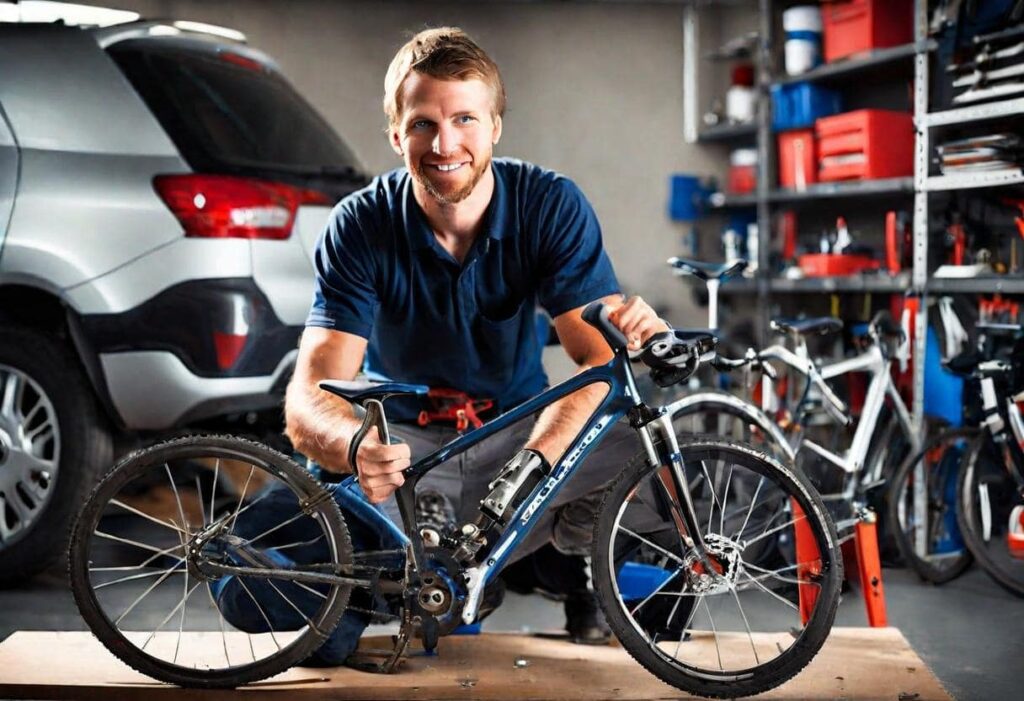
Once you’ve gained the necessary education and hands-on experience, it’s time to build your career. Here’s how to get started and advance in the field:
Starting with Entry-Level Positions in Bike Shops
Begin your career by seeking entry-level positions in bike shops. These roles allow you to:
- Gain Experience: Work on a variety of bikes, from basic to complex repairs.
- Learn Shop Operations: Understand how bike shops function, including inventory management and customer service.
- Develop Your Reputation: Build a reputation for quality work and reliability.
Networking Within the Cycling Community
Networking is crucial in the bike mechanic industry. Here’s how to effectively network:
- Join Cycling Clubs: Participate in local cycling clubs and events.
- Attend Trade Shows: Go to bike trade shows and expos to meet industry professionals and stay updated on the latest trends and technologies.
- Online Communities: Engage with online forums and social media groups dedicated to bike mechanics and cycling.
Continuing Education and Advanced Certifications
To stay competitive and advance your career, continue learning and obtaining advanced certifications. Consider:
- Specialized Training: Take advanced courses in areas like electric bike repair, suspension systems, and custom bike building.
- Professional Development: Attend workshops, webinars, and industry conferences.
- Certifications: Pursue additional certifications from recognized institutions like UBI and Park Tool School.
Tools and Equipment Every Bike Mechanic Should Have
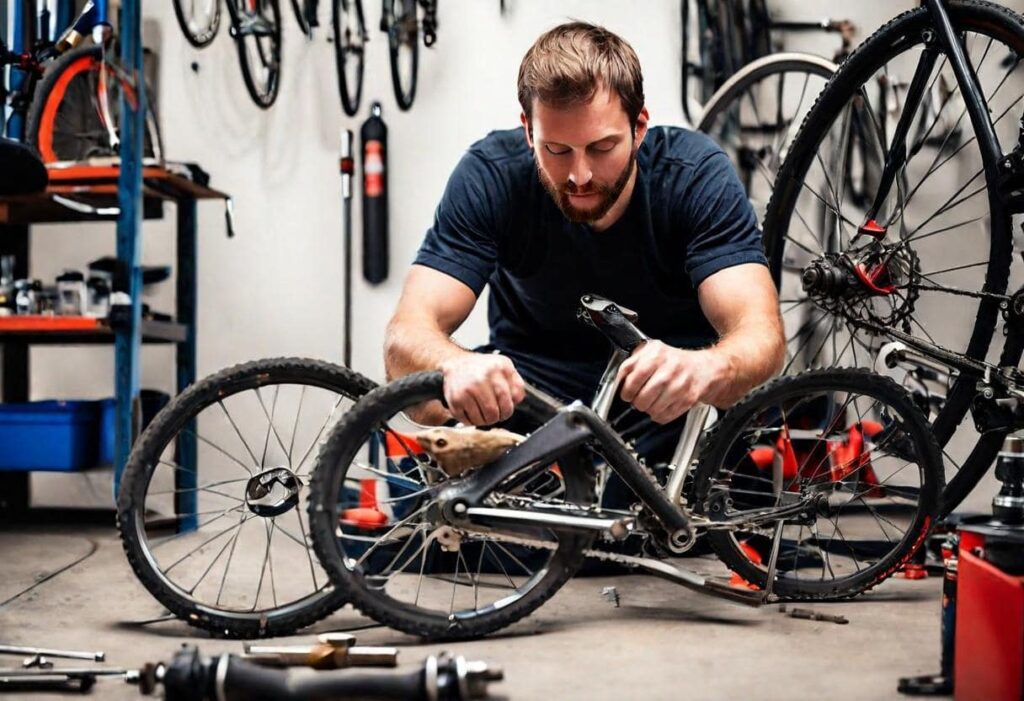
Equipping yourself with the right tools is crucial for any bike mechanic. Having a well-rounded toolkit not only makes the job easier but also ensures that you can handle a wide range of repairs and maintenance tasks efficiently.
Basic Tools: Wrenches, Screwdrivers, Spoke Keys
Starting with the basics, every bike mechanic should have a core set of tools. These are essential for most repair and maintenance tasks:
- Wrenches: A variety of wrenches, including Allen (hex) wrenches and open-end wrenches, are vital. They are used for adjusting brakes, derailleurs, and various other components.
- Screwdrivers: Both flathead and Phillips screwdrivers are necessary for adjusting screws on components like derailleurs and shifters.
- Spoke Keys: These are essential for truing wheels, ensuring they are straight and round.
Specialized Tools: Torque Wrenches, Wheel Truing Stands
As you gain experience and start tackling more complex repairs, specialized tools become indispensable:
- Torque Wrenches: These are crucial for ensuring that bolts and nuts are tightened to the manufacturer’s specifications, preventing over-tightening or under-tightening, which can cause damage or safety issues.
- Wheel Truing Stands: These stands hold wheels in place, allowing you to true (straighten) them accurately. Truing is essential for maintaining wheel performance and longevity.
Recommended Brands and Where to Buy
Quality tools are a worthwhile investment. Here are some recommended brands and places to buy:
- Park Tool: Known for their durability and comprehensive range of bike-specific tools. You can get their products on the official website and from various online sellers.
- Pedro’s: Another reliable brand offering a wide range of tools. You can find them on their official site or through major bike shops.
- Amazon: A convenient place to buy tools from various brands, often with user reviews to help guide your choices.
Challenges and Rewards of Being a Bike Mechanic
Every profession has its ups and downs, and bike mechanics are no exception. Understanding the challenges and rewards can help you decide if this career is right for you.
Common Challenges: Dealing with Difficult Repairs, Managing Customer Expectations
- Difficult Repairs: Some bike issues can be tricky to diagnose and fix, requiring patience and problem-solving skills. Advanced repairs often need specialized knowledge and tools.
- Customer Expectations: Managing customer expectations can be challenging. It’s important to communicate clearly about repair timelines and costs, and sometimes customers may not understand the complexities involved in fixing their bike.
Rewards: Job Satisfaction, Community Impact, Potential Earnings
- Job Satisfaction: There’s a great deal of satisfaction in fixing a bike and knowing that you helped someone enjoy their ride safely.
- Community Impact: Bike mechanics play a crucial role in promoting cycling as a sustainable mode of transportation, contributing to healthier communities.
- Potential Earnings: While the salary can vary based on location and experience, bike mechanics can make a decent living. According to the Bureau of Labor Statistics, the median pay for bike mechanics is around $29,450 per year.
Frequently Asked Questions About Becoming a Bike Mechanic
To provide further clarity, here are answers to some common questions about becoming a bike mechanic.
How Long Does It Take to Become a Bike Mechanic?
The time it takes to become a bike mechanic varies. Some people enter the field with little formal training and learn on the job, while others may attend courses and earn certifications, which can take a few weeks to several months.
What Are the Average Salaries for Bike Mechanics?
Salaries for bike mechanics can vary widely based on experience, location, and the type of shop they work in. On average, bike mechanics in the U.S. earn around $29,450 per year, but experienced mechanics in high-demand areas can earn more.
Can You Start a Bike Repair Business?
Yes, many bike mechanics eventually start their own repair businesses. This can be a rewarding path but requires business acumen, a solid customer base, and the right tools and facilities.
Conclusion
In summary, becoming a bike mechanic involves gaining the right education, hands-on experience, and continuously upgrading your skills and tools. It’s a rewarding career that combines technical expertise with customer service. Whether you’re just starting or looking to advance your career, there’s always something new to learn in the world of bike mechanics. So, gear up and get ready to dive into a profession that keeps you on your toes and on the road.
FAQs
Is it cheaper to paint orHow to get into bike mechanic? wrap a motorcycle?
To become a bike mechanic, start by gaining a high school diploma or GED. Enroll in specialized courses at institutions like the United Bicycle Institute or Park Tool School for formal training. Seek entry-level positions or internships at local bike shops to gain hands-on experience. Volunteering at community bike co-ops can also provide valuable practical skills. Networking within the cycling community and staying updated on the latest technologies will further enhance your career prospects.
How to get experience as a bike mechanic?
Gaining experience as a bike mechanic involves several steps. Begin by volunteering at local bike co-ops or community repair events to get hands-on practice. Look for internships or apprenticeships at bike shops to learn from experienced mechanics. Enroll in certification programs offered by institutions like the United Bicycle Institute or Park Tool School. Participating in online courses and workshops can also help build your skills and knowledge, making you a more competent mechanic.
What skills do bike mechanics have?
Bike mechanics need a mix of technical and interpersonal skills. Technically, they should understand bike anatomy, repair techniques, and tool usage, including wrenches, screwdrivers, and spoke keys. Interpersonally, they need strong customer service skills to explain repairs and manage expectations. Problem-solving abilities are crucial for diagnosing and fixing issues efficiently. Continued learning and staying updated on new bike technologies also play a significant role in a bike mechanic’s skill set.
What is called bike mechanic?
A bike mechanic, also known as a bicycle technician, is a professional who repairs and maintains bicycles. They work in bike shops, repair centers, or independently, performing tasks such as diagnosing issues, conducting repairs, and performing regular maintenance. Their role involves a mix of technical skills for fixing bikes and customer service skills for interacting with clients. The job requires a deep understanding of bike mechanics, tools, and the ability to solve complex mechanical problems.

